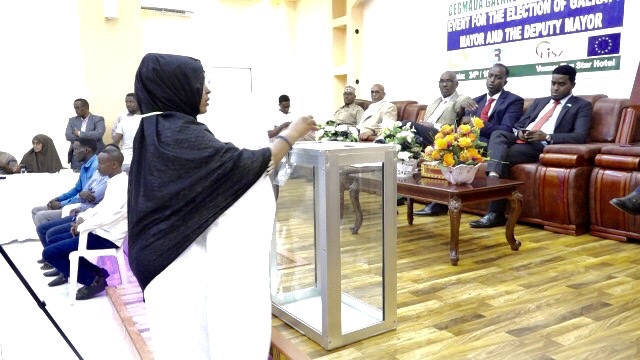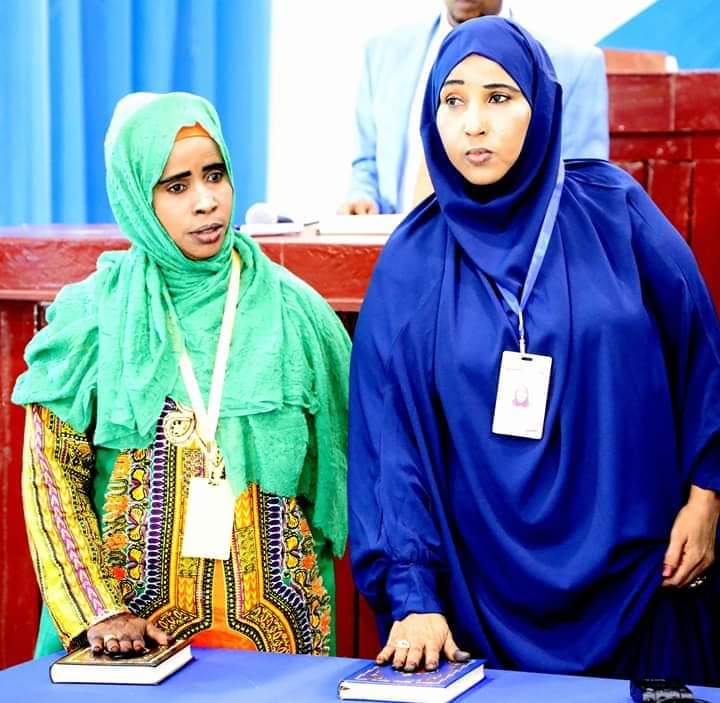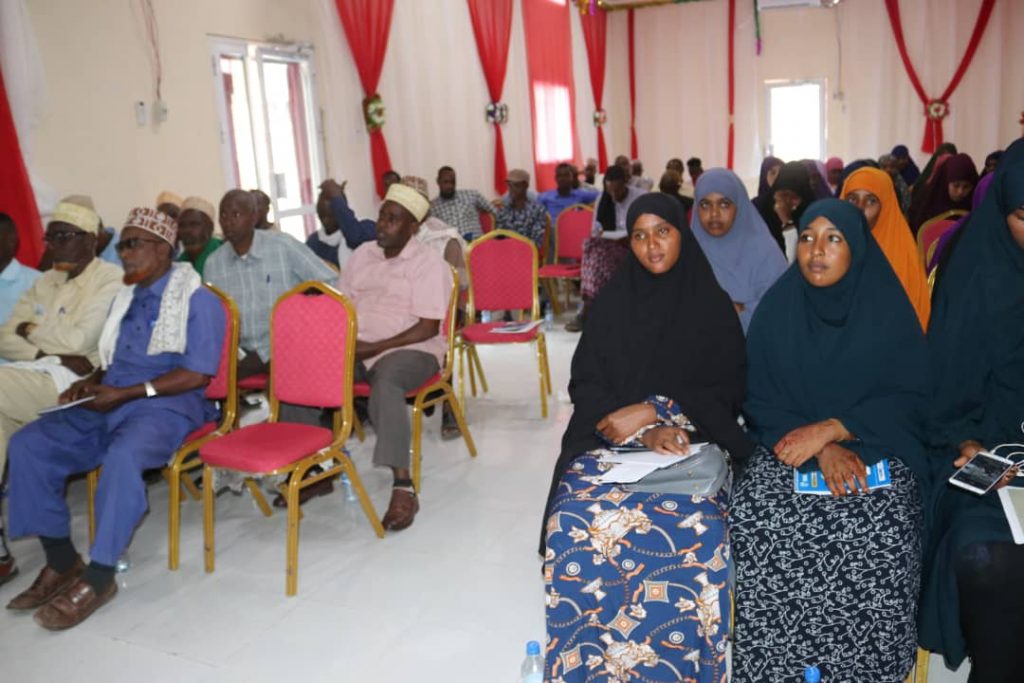FCA contributing to profound shift in women’s political participation in Somalia
FCA’s persistent work has led to a significant increase in women’s political participation in Somalia and contributed to a change in local decision-making.
Two of Finn Church Aid’s (FCA) projects in Somalia have helped to move the country towards sustainable peace by advancing gender equality and increasing women’s political participation. FCA has strengthened women’s capacities, increased their opportunities for civic participation, and helped to build fair and equal governance bodies at different levels through trainings, discussions and multi-level advocacy.
“FCA’s team in Somalia works in a challenging environment but on the other hand, the timing of this intervention has fitted well into the state building process following the civil war,” Programme Manager Bashir Fidow from FCA Somalia office tells.
Somalia is one of the most unequal countries towards women due to cultural beliefs and institutional bias and discrimination. Many people still believe that women belong at home and do not have a place in the informal or formal decision making structures. Traditional practices and customary laws are often applied instead of state judiciary. Historically the representation of women in politics is very low.
FCA’s work to increase women’s involvement in politics and in the society
Within the Gender Equality and Social Inclusion (GESI) project framework, there have been numerous trainings, citizen interface dialogues, debates, and meetings. FCA Somalia team with their partners Centre for Research and Development (CRD) and Ministry of Women and Human Right Development (MoWHRD) have advocated for women’s participation in politics. These platforms provided by the projects have offered women an important channel to be heard but also to learn from each other. The results have been encouraging as hundreds of women have participated in trainings about their rights and the social and civic responsibility of active citizens and elected leaders which has given them the confidence and the skills to participate in decision-making processes.
FCA has advanced inclusive district council formation, including the quota of at least 30 % women in the newly formed district councils. The project has contributed to significant political developments. FCA led the consortium that supported the establishment of four district councils in Berdale and Hudur of SWS in 2018, and Afmadow in Jubaland and Galkacyo in Galmudug in late 2020 with inclusive participation of women and youth. Two women were elected as council members in Berdale, five in Galkacyo and another two in Afmadow. A National Gender Policy was developed for the South West State. In the local elections in the South West State, the number of women’s seats saw a significant increase. There are currently 16 female parliamentarians and a female deputy speaker in the SWS Assembly.
FCA Somalia has implemented several projects in Somalia to promote inclusive governance and women’s political participation. ‘Gender Equality and Social Inclusion’ (GESI) worked in Baidoa, Hudur and Berdale Districts of the South West State (SWS) and was funded by the Somalia Stability Fund (SSF).
‘Strengthening local governance structures and systems for more accountable and inclusive Federal Member States in support of the Wadajir National Framework’ Phase II’ targeted the district council formation through democratic process in the SWS, Hirshabelle, Jubaland and Galmudug, and was funded by the EU. The goal of Strengthening Local Governance project was to bring inclusiveness to District Council formation and have a 30 % quota for women.
FCA has worked in Somalia since 2008 and advanced sustainable peace from the beginning. The country programme operates in four states, South West State, Hirshabelle, Galmudug and Jubaland, and has been active during the time when the federalism and decentralisation efforts have been taking place. FCA has operations also in Mogadishu and Somaliland.

Advocacy on multiple levels of society
“A key element in these projects has been the multi-level strategic advocacy,” says Business Development Manager Leakhena Sieng from FCA Somalia.
The projects’ partners have been essential for effective advocacy. The MoWHRD has supported FCA in building networks and organised meetings and platforms for women and the political gatekeepers to meet, discuss and make decisions.
“FCA’s interventions engaged people on the local level, clan leaders as well as ordinary families,” tells Abdulwahab Osman, acting Local Governance Project Manager at FCA Somalia. “The projects have harnessed networks of women to advocate with traditional and religious leaders about the importance of women’s participation. There have been numerous occasions, workshops and discussions, where the importance of women’s engagement has been debated.”
The GESI project worked with clan elders so that they support and indeed enable women’s active political participation. Somalia’s governance system is heavily influenced by the clan-based social structure and without the support of clan elders, women’s inclusion and leadership is difficult. FCA identified traditional and local leaders as important change agents early on. When the local leaders are convinced about the need to have women in positions of power, in Somalia that is a major advantage, in relation to local communities as well as political leaders.
It has been important to challenge the traditional structures and roles that have prevented women from participating actively in the society. Women have been discouraged from education and girls have been denied their right to learn. The women that FCA has trained have visited villages and spoken to women themselves as well as their families to show how women can take an active role and why they should do it.
“One central goal has been to increase overall public awareness and now 56 per cent of the project’s beneficiaries say that they are able to influence decisions in their community,” tells Leakhena Sieng.

Women supporting and helping each other
FCA wanted to provide aspiring women the tools and the confidence that they need to participate actively in politics. The BAY Women Association Network (BAYWAN) has been key to this process. The network was established by the 207 trained women by FCA and CRD with the purpose to provide a supporting circle for women from all backgrounds and age groups to come together and exchange views and experiences.
The BAYWAN has contributed to change in various levels of society. They have been a great asset to the GESI project in arguing for and advocating women’s active participation in society and girls’ education and equal rights.
“FCA selected 150 young women from universities’ political sciences department to participate in trainings and discussions, with the aim of preparing future leaders, helping them to form networks, giving them confidence to speak out and providing them with a platform for discussions and dialogues with their peers and mentors,” Mr Fidow says.

FCA brought together the young aspiring women and female politicians to inspire the younger generation. The Ministry of Women offered internships and volunteer opportunities for university students. What these women with FCA and its partners have done locally in the South West State has been so successful and inspirational that these good practises have spread and have been adopted in different districts in Somalia.
Profound change towards sustainable peace is possible
FCA’s efforts in Somalia to increase women’s political participation and gender equality has overall been a great success. FCA has helped to bring together the media and key decision-maker and people of power. Because of the publicity that the increase of the number of women in politics has received in the media, especially in Galkacyo, Afmadow and Diinsoor, where a number of women have been elected as council members, this has become a mainstream issue, Mr Fidow says.
FCA’s projects have had a huge impact. More than 700 women and numerous clan and religious leaders have been trained as leaders and agents of change for gender equality and women’s empowerment. The number of women in politics has increased and the enthusiasm of young women at universities shows that this trend is likely to continue.
“Now we are ahead of the other federal states in terms of women’s political participation. I urge other states to be like SWS and provide women political space,” says Faduma Ali Ahmed, MP in the SWS District Assembly.
The UN Sustainable Development Goal number five states that ‘gender equality is not only a fundamental human right, but a necessary foundation for a peaceful, prosperous and sustainable world’ and this is very important in a country like Somalia that has been suffering from civil war and violent extremism for decades.
Goal 16, ‘promoting peaceful and inclusive societies for sustainable development, providing access to justice for all and building effective, accountable and inclusive institutions at all levels’ is intimately tied to FCA’s work in Somalia. The results of FCA’s projects show that great steps have been taken in Somalia towards this goal.
Written by: Nora Luoma
Photos: Abdulwahab Osman